Review: 'Gusko Budori no Denki' ['The Life of Guskou Budori']
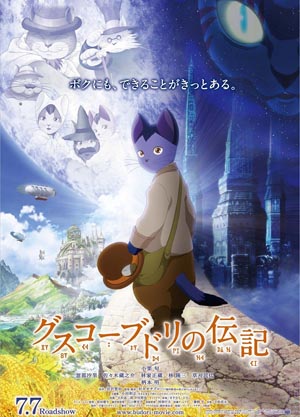 Gusk? Budori no Denki (The Life of Guskou Budori) is a 105-minute anime film released in 2012. The story had been previously adapted into anime in 1994, however the 2012 version did it with anthropomorphic cats - largely identical to the cats in the 1985 anime film Night on the Galactic Railroad. Not coincidentally, both films were directed by Gisaburo Sugii, and both were based on stories written by Japanese author Kenji Miyazawa, published in the 1930s.
Gusk? Budori no Denki (The Life of Guskou Budori) is a 105-minute anime film released in 2012. The story had been previously adapted into anime in 1994, however the 2012 version did it with anthropomorphic cats - largely identical to the cats in the 1985 anime film Night on the Galactic Railroad. Not coincidentally, both films were directed by Gisaburo Sugii, and both were based on stories written by Japanese author Kenji Miyazawa, published in the 1930s.
The 2012 Life of Guskou Budori is visually rich, but has an incredibly dull narrative. Full spoilers ahead! Budori, his parents and his younger sister have an idyllic life in a forest by the mountains, but two years of sudden cold weather leads to the death of his parents and everyone leaving the local village. Oh, and his sister is taken away by a mysterious entity. To paraphrase:
Supernatural cat: I'm here to save you from famine. You're good kids, but that won't help you. Hey girl, if you stay here, you'll starve. Come with me.
(Budori's sister goes to him, seemingly in a trance.)
Supernatural cat: Well, bye! (vanishes)
Budori: ...Hey! You thief!
With nothing left, Budori leaves the forest and is hired by a married couple to help with their farm. Things are OK at first; then there's a drought and they can't afford to keep him on, so he leaves for the big city. Not knowing anyone, he finds a university where there's a professor who's written some textbooks he enjoyed reading. Sitting in on his class, the prof asks him what he's doing there. He replies, "Oh, I just came to town, I'm looking for work," and the prof immediately gets him a job without asking what his skills are.
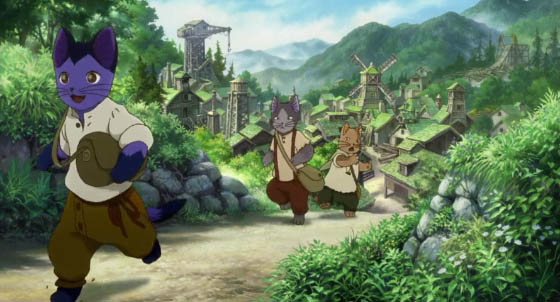
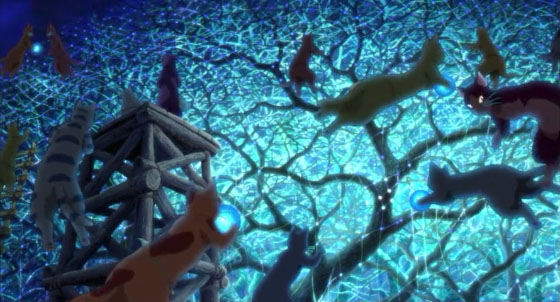
Given that his skills are in farming, it's only natural that he fits in perfectly at his new job as a volcanologist and climatologist, working with a whole bunch of research scientists in an advanced laboratory. Another cold period is on its way, and Budori doesn't want anyone else to suffer the way his family did. Idea! Make a volcano erupt, releasing carbon dioxide into the air, creating global warming, and the cold period will be eliminated. But his co-workers are doubtful about being able to control the weather.
Budori: (Alone in his room) Other people have helped me all my life. Now I want to help them back. I'll do anything.
Supernatural Cat: You called?
Budori: No.
Supernatural Cat: I can take you to the volcano.
Budori: Can I make it erupt?
Supernatural Cat: I dunno.
Budori: If I can make it erupt by giving up my life, I'll do it!
Supernatural Cat: Ok, here we go!
The volcano erupts. There's no cold period, life goes on just fine, the end.
This film has a couple of big flaws, such as the unresolved issue of Budori's missing sister. At three points, Budori goes into a dream-state where he finds himself in a bizarre alternate world. In the first dream, he's given a surreal job to harvest silkworm guts. In the second dream, he chases the supernatural cat through a city and sees an image of his sister on a poster, now working as a hypnotized circus acrobat. In the third dream, the supernatural cat takes him to court for trespassing in his reality. So why does Budori trust him at the end of the film? Beats me.
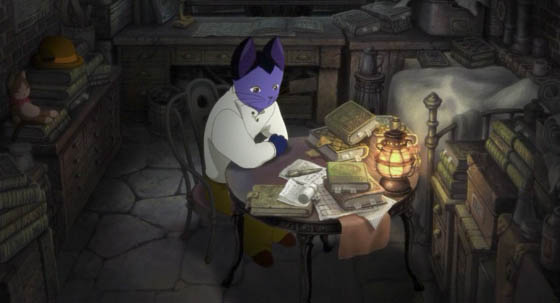 Then there's the farmer he works for. Keep in mind that this film has advanced technology, is kind of steampunk (with valves and airships), and also has modern-looking computer readouts and displays. This is in stark contrast to the naïveté of the farmer, who thinks he's god's gift to farming, except he doesn't understand that he's over-fertilized his crops, and tries to deal with plant disease by irrigating his fields with a mixture of water and motor oil.
Then there's the farmer he works for. Keep in mind that this film has advanced technology, is kind of steampunk (with valves and airships), and also has modern-looking computer readouts and displays. This is in stark contrast to the naïveté of the farmer, who thinks he's god's gift to farming, except he doesn't understand that he's over-fertilized his crops, and tries to deal with plant disease by irrigating his fields with a mixture of water and motor oil.
Or take Budori himself. His whole life is about work. That's it. He's never shown taking a vacation, or having any friends, social life or romantic interests of any kind - even his spare-time reading is work-related, and he barely accumulates any personal property. He never shows any emotional distress due to his lifestyle. The work ethic mindset in this film is very Japanese, it's all about devoting himself fully to his employers. At the end of the film, his outlook is that this has been an act of kindness given to him, one that he's never been able to pay back, and that sacrificing his life is the ultimate way to achieve it.
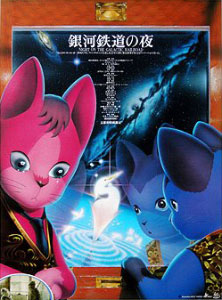 More bizarrely, the primary antagonist in this film... is bad weather for farming. Another problem is that large volcanic eruptions actually reduce temperatures because of all the dust and ash they release into the air. (At least, on Krakatoa's scale.)
More bizarrely, the primary antagonist in this film... is bad weather for farming. Another problem is that large volcanic eruptions actually reduce temperatures because of all the dust and ash they release into the air. (At least, on Krakatoa's scale.)
And man, is this film boring. The first quarter is Budori's daily life, growing up and losing his family. Another quarter are his otherworldly (but largely useless) dream sequences. The rest is him working at his jobs. All it's got going for it are good visuals. Some obvious CGI here and there, but still well-drawn.
Let me contrast here with the director's earlier 1985 animated cat film, Night on the Galactic Railroad. Its pace is also very slow, even sleepy. ("Ethereal" is how a friend of mine described it.) The animation quality is relatively more primitive - though pretty average by 1985 standards. On the plus side, it's very atmospheric, a bit of a mind-trip, and has a better soundtrack. Still, it's rather lacking in subtlety in terms of using a lot of Christian symbolism, and the ending is quite depressing. It's not a film I'd like to watch again - and yet it's still far more interesting to watch than The Life of Guskou Budori, that's how dull it is.
My recommendation: only for dedicated, watch-everything anime fans. Otherwise, don't bother.

Comments
But... I liked it... :(
Also... this was the first news piece I submitted! :D
http://www.flayrah.com/4153/gusk%C3%B4-budori-no-denki-shows-japanese-sure-love-...
Well, I'll be...
Aw, don't be glum, I'm glad you liked it! I enjoyed the visuals, though not much else - I think I was simply expecting more out of it, and the creators were interested it achieving something else with the production. Well hey, give Night on the Galactic Railroad a try then! :)
I meant I liked the actual story. Disagreements. Opinions.
And not only did I watch Galactic Railroad at least 3 times, I own the soundtrack CD.
Well, I'll be...
Go into detail! What worked for you, what aspects were evocative, what drew your interest as it progressed? Post a contrasting view to add more perspective that other people can read here! :)
IMDB is a website specifically made for such things. I don't need to write a review; many others already did.
Well, I'll be...
For convenience, here's the IMDB link. :)
You sure sucked at watching this movie. You are missing the point globally speaking, and when you try to point out every "incoherence" you "found", you miss and miss again.
I´ll take just a bit for example:
"He's never shown taking a vacation, or having any friends, social life or romantic interests of any kind - even his spare-time reading is work-related, and he barely accumulates any personal property."
Just how the fuck you came to that? Stick to hollywood and shut up.
I'm not sure dronon has ever done Hollywood. It's not really their thing.
I liked Night on the Galactic Railroad, and even purchased the children's interactive book on itunes (definitely recommend).
Gusko Budori was a bit more dry but still interesting. I probably won't watch it again though.
I would recommend Kenji no Haru (Spring and Chaos) if you haven't seen it yet. One of my favorite anime.
I agree that it is a very flawed film, but I enjoyed more than just the visuals. Specifically, I actually very much enjoyed the story of his battle to find somewhere to live and work while trying to find his sister and find a cure to cold snaps and long winters. I thought the first 3 quarters of the film did a pretty decent job of weaving back and forth between the main narrative and the dream world. It probably helps that I don't mind a slow paced movie and I don't need a living character to be the "bad guy"
My real problem is with the last quarter, where the dream sequences end, along with the quest for his sister, and then randomly he has to die to make the volcano explode and save everyone. And then the just movie ends. While I got tired of the Christian elements, I quite like Night on the Galactic railroad as it more or less resolved all of it's narratives. 'Gusko Budori no Denki' just sort of feels like they got tired of writing the plot somehwere around the climax (lets say when he goes to the university) and just sort of wrote in a lazy ending. It slowly builds up for no real pay-off, which I'd say NotGR for the most part had.
My family had a cat named Zoop, in the early 1960s.
Fred Patten
I think that of the two films, both of which are slow, Gusko has the better visual and animation quality, but Night on the Galactic Railroad is more engaging, if only due to its odd, overall dreamy atmosphere. It also has the better soundtrack. :-)
hey, anyone saw the two kids from Night" on the Galactic Railroad ", in this movie ? when budori was in the other world and was climbing the ladder looking for the supernatural cat ?
For anyone coming here after all these years : The guy didn't understand shit to the movie.
His sister is dead, and she wished to sacrifice her life to save the village from starvation.
Hinted throughout the movie.
The "dream" Budori sees is the afterlife. You've seen Night on the Galactic Railroad, you could've easily guessed that. He's taken to court because for some reason, Budori, like Giovanni in Night on the Galactic Railroad, is the only one with random access to the afterlife although he's still alive. That world can also be seen as Budori's internal conflict, trying to cope with the death of his sister and not accepting it (especially since whenever he's out of that dream world, he never even talks about his sister at all. It's only when he's in it that he searches her, hinting that in the real world he probably knows that she's dead, but whenever he's all alone and only with himself (dreaming), he still wants to believe she's alive and was taken).
When he "trusts" the judge ("supernatural cat") at the end, after making a wish in silence, it instantly hints you that this cat is from the afterlife and takes people's life in exchange of wishes, if they're willing to sacrifice themselves. And just like Budori does at the end of the movie, you can guess that it's probably exactly what happened at the beginning of the movie, except Neri made the wish.
This is about self-sacrifice, just like Night on the Galactic Railroad. And you've even seen both, how could you miss the point? What's so hard to get?
Also, I think the soundtrack is a ton better than Night on the Galactic Railroad.
For most of the movie (before the wish at the end and the last dream where the judge says he "trepassed" in that dream world), you don't really understand anything, but then it all becomes clear, which makes this a movie that's actually interesting to rewatch, because you won't be like "wait, what's happening again?" during half of the movie if you rewatch it. Was a little boring at the beginning since the explanations came so late, but in the end it becomes all clear if you actually use your head instead of watching with your brain turned off.
Actually I'm glad to have a thought-out response posted! If there was a symbolic subtext to the movie, then you are indeed correct, it entirely flew over my head. Neither did I consider looking for parallels between what I viewed as two separate films. I never thought of the afterlife option. I mean, consider someone who isn't either of us, who hasn't seen the other film, which came out twenty-seven years earlier, how would they know?
If Night on the Galactic Railroad, was, as I said, rather lacking in subtlety, in light of your analysis, The Life of Guskou Budori was too subtle for me. I will take issue with one of your theories, although it's been so long I may be mis-remembering the sequence. I got the impression there was no one left in the village, so Neri wouldn't be sacrificing herself for that reason. However, I can picture her making a silent wish to save her brother's life, so your general point still stands! And music-wise, that's so subjective I don't think we could have a useful argument about that.
Anyway, if other people are reading this: If you're curious, give the film a chance while keeping Citan's comments in mind, especially if you're more symbolically analytical than I am. I don't know if his interpretation is what the director intended, but it does re-contextualize many of the scenes I had problems with in a way that makes more sense.
Also: Mister Twister, when you seemed unwilling to write up your own detailed impressions here, you said that "IMDB is a website specifically made for such things. I don't need to write a review; many others already did." I provided a link to IMDB which you probably didn't bother to check. Over two years on, there are still precisely zero user reviews.
Edit: This review is even more informative, and I'm not alone ("gloriously beautiful if opaque and perplexing") - turns out the director incorporated bits of pieces from several stories by Kenji Miyazawa, even changing the context as the author initially intended them. Interesting reading!
I have never watched the Galactica movie, but by the trial part I understood that the sister was probably dead. The judge kept saying things about the other realm or whatever. Then at the end when Budori didn't come back it solidified my theory.
I'm so sad that the whole family died.
Post new comment